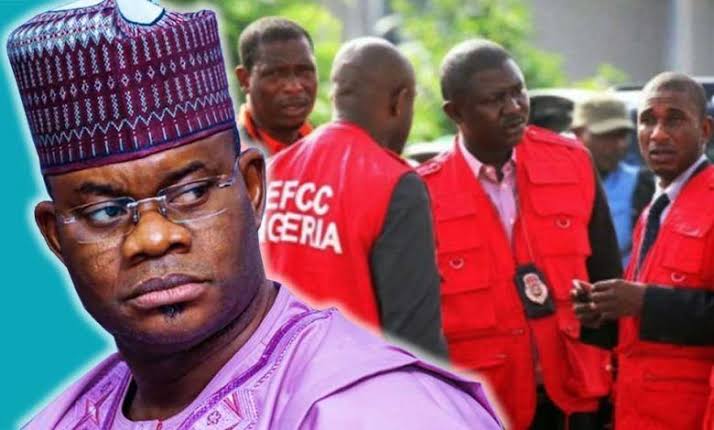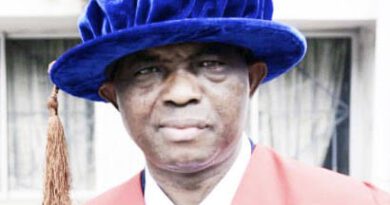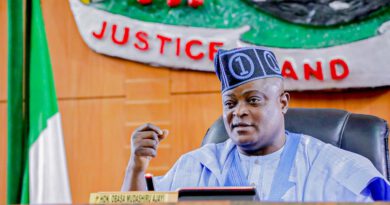Yahaya Bello: EFCC and support beyond Kogi ex-governor
By Yusuf Mohammed
The parlance: ‘’corruption will fight back’’ has never been more evident. Corruption fights back in several forms. Currently, one of the forms it is fighting back is the propaganda that the Economic and Financial Crimes Commission’s pursuit of former governor of Kogi State, Yahaya Bello is a political witch-hunt.
There is also the problem of division, which is another way corruption is fighting back. Unlike the earlier form I mentioned, this instance is somewhat organic. Let me explain. Nigeria in recent times has become so polarized across several lines that ascribing imaginary motives to almost every action or complaint is fast becoming the order of the day. One of the analogies I often use in this regard is: when someone comes out to complain about a pothole on the road, which is visible to everyone and affecting the car tyres of road users, rather than focus on the problem, people would want to know where the complainer is from. Some would even want to know the political affiliation of the person complaining. This is the sad point we are in this country. And unfortunately, the EFCC has also been caught in this web, as there are some persons drumming support for the narrative that the agency is doing the bidding of Bello’s political enemies. This notion has been gaining traction since the failed attempt to apprehend Bello in April.
Even some members of the Kogi State House of Assembly have joined the bandwagon to peddle this narrative.
During last week’s plenary in Lokoja, some lawmakers condemned EFCC’s most recent siege to the Kogi State’s Governor’s Lodge in Abuja, in an attempt to arrest Bello. As a result, the lawmakers called for the dismissal of the EFCC chairman, Olanipekun Olukoyede.
It is shameful to say the least that lawmakers who were elected by the people to represent them seem to be playing politics with a case bothering on the alleged misappropriation of funds belonging to the people. What have the lawmakers said about Bello evading arrest and refusing to appear in court to defend himself? Or are they trying to lend credence to those who say Bello is still in charge of the state through his proxy, Governor Usman Ododo?
According to the chairman of the EFCC, one of the reasons Bello gave for avoiding the EFCC in a telephone conversation was that he believed that ‘’a certain lady has surrounded the EFCC with over 100 journalists to embarrass him.’’
The EFCC boss revealed this in April while addressing media executives at the Corporate Headquarters of the agency.
“On my honour, I put a call to him to honour him as a former governor. He said, I can’t come, claiming that a certain lady has surrounded the EFCC with over 100 Journalists to embarrass or intimidate him and all that stuff. I said if that is your fear, I will make you come directly to my floor. I will invite my operatives to interrogate you in my own office. What could be more honourable than that? Do you know what he said? ‘Can’t they come to my village?’ My Director of Investigations also sent a message to him”, he said.
I have a few questions for those who are not trying to entertain any other conversation other than the chase being a political one. Let’s assume some people are out to get Bello for political reasons. And let’s also assume that he looted the state’s treasury. Was it with the help of those who are trying to ‘humiliate’ him today? Were they the ones who encouraged him to misuse public funds?
In other words, if it has been established that he misappropriated funds belonging to the people of Kogi State, is it the fault of his political enemies who are out to get him?
If he is innocent, shouldn’t he be in court to defend himself? If he is evading arrest because he thinks ‘’a certain lady has surrounded EFCC with journalists to embarrass him’’ is he also avoiding the court for the same reasons?
Many would argue that the allegations levelled against the former Kogi governor is in line with what many Kogi civil servants went through when Bello was at the helm of affairs.
Many of them were not receiving their full salaries due to the screening process for ghost workers. Also, the bailout funds he received from President Muhammadu Buhari was not commensurate with the level of development in the state during his tenure.
The EFCC boss, Olukoyede said he was worried at the report of larceny available to the EFCC concerning the former governor. “A sitting governor, because he knew he was going, he moved money directly from the government’s account to a bureau de change to pay his children’s school fees in advance, $720,000, in anticipation that he was going to leave government house”, he said.
These allegations have not been properly refuted by Bello and his team. Instead, they have been playing politics with the situation by accusing imaginary enemies of fuelling it.
In regards to the detractors of the EFCC, the agency’s chairman said that no matter what anyone does or the amount of attack against the anti-graft agency, he and his men will not relent in helping to sanitise the country.
Olukoyede said that the EFCC needs the support of Nigerians to succeed, making it clear that if the agency fails, Nigeria fails. He also added that the efforts made currently have helped the value of the naira and the foreign market.
When I heard Olukoyede speak for the first time, I could tell he was passionate about his job and was burning with the zeal to bring an end to the case. And another thing that came to mind was that Nigerians need to rally behind him and the agency
Beyond the Yahaya Bello ‘wahala,’ supporting the EFCC is crucial for many reasons, especially in a country like Nigeria, where corruption and financial crimes have historically hindered development and progress.
There’s no doubt that corruption is one of Nigeria’s biggest challenges. It has drained resources from critical sectors such as education, healthcare, and infrastructure. The EFCC plays a vital role in tackling this by investigating and prosecuting corrupt individuals, particularly public officials who misuse their power.
Corruption and financial crimes often involve the diversion of public funds, which deprives citizens of essential services. The EFCC’s role in investigating and recovering stolen funds ensures that these resources can be redirected toward their rightful use, such as infrastructure development, healthcare, education, and social services.
The fight against corruption will also help improve Nigeria’s image internationally. This country has often been viewed internationally as a country plagued by corruption and fraud, which affects diplomatic relations and limits the nation’s potential for global partnerships. The EFCC’s efforts to combat these issues will help improve Nigeria’s image abroad.
The clarion call for Nigerians to support the EFCC is not just about Yahaya Bello; it is about building a better Nigeria. It is essential for promoting transparency, accountability, and good governance, which are the foundations of a prosperous and fair society. The fight against corruption benefits everyone, as it leads to better public services, economic growth, social justice, and a stronger democracy.




